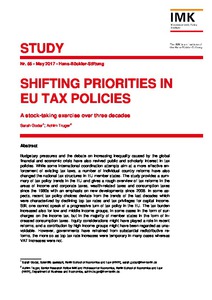Shifting priorities in EU tax policies. A stock-taking exercise over three decades
"Budgetary pressures and the debate on increasing inequality caused by the global financial and economic crisis have also revived public and scholarly interest in tax policies. While some international coordination attempts aim at a more effective enforcement of existing tax laws, a number of i...
| Main Authors: | , |
|---|---|
| Institution: | ETUI-European Trade Union Institute |
| Format: | TEXT |
| Language: | English |
| Published: |
Düsseldorf
2017
IMK |
| Subjects: | |
| Online Access: | https://www.labourline.org/KENTIKA-19287846124910050289-Shifting-priorities-in-eu-tax-.htm |
| Summary: | "Budgetary pressures and the debate on increasing inequality caused by the global financial and economic crisis have also revived public and scholarly interest in tax policies. While some international coordination attempts aim at a more effective enforcement of existing tax laws, a number of individual country reforms have also changed the national tax structures in EU member states. The study provides a summary of tax policy trends in the EU and gives a rough overview of tax reforms in the areas of income and corporate taxes, wealth-related taxes and consumption taxes since the 1980s with an emphasis on new developments since 2008. In some aspects, recent tax policy choices deviate from the trends of the last decades which were characterized by declining top tax rates and tax privileges for capital income. Still, one cannot speak of a progressive turn of tax policy in the EU. The tax burden increased also for low and middle income groups, in some cases in the form of surcharges on the income tax, but in the majority of member states in the form of increased consumption taxes. Equity considerations might have played a role in recent reforms, and a contribution by high income groups might have been regarded as unavoidable. However, governments have refrained from substantial redistributive reforms, the more so as top tax rate increases were temporary in many cases whereas VAT increases were not." |
|---|---|
| Physical Description: | 33 p. Digital |

